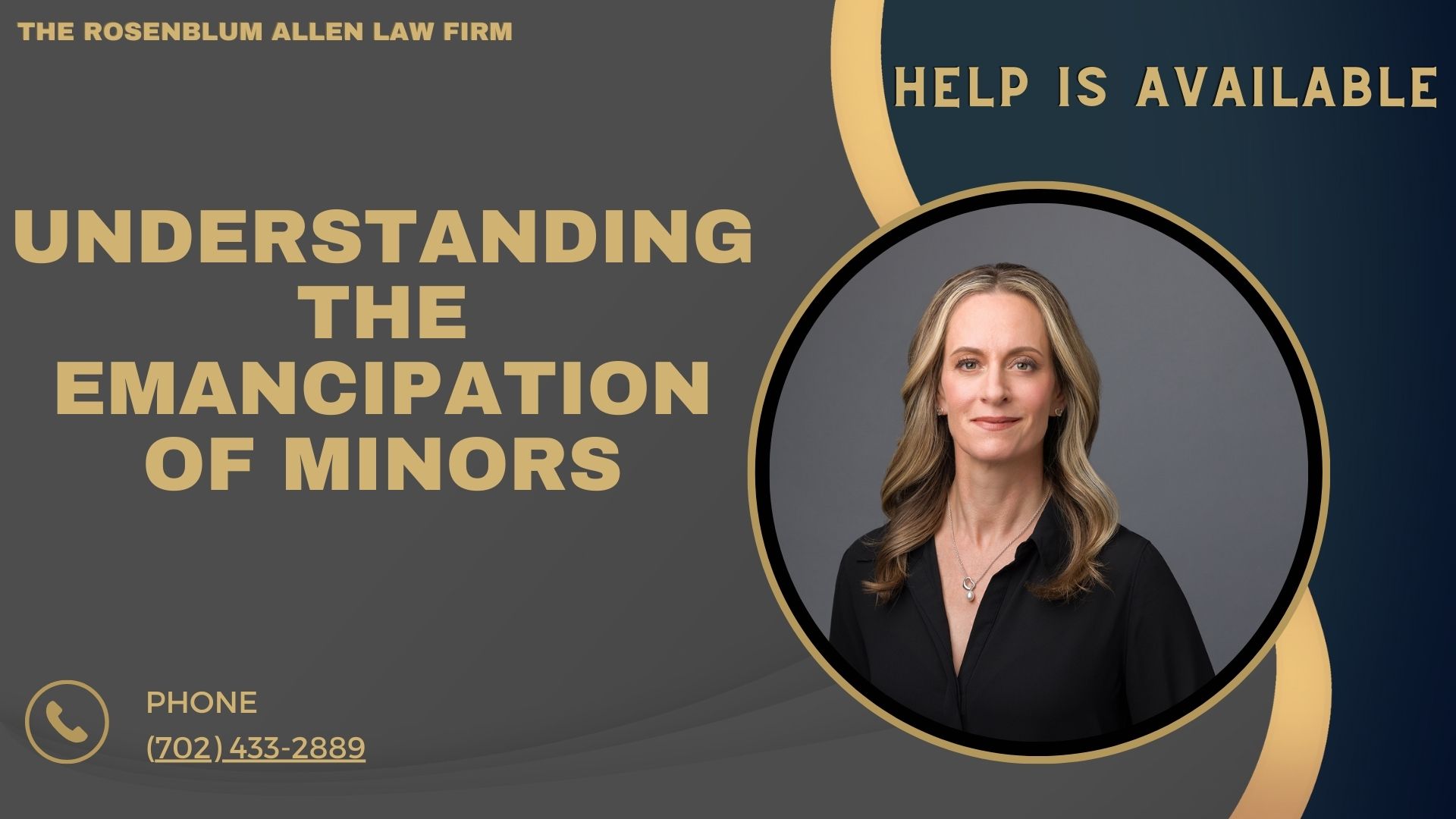In the journey to adulthood, some minors seek legal autonomy through emancipation. This guide sheds light on the process, its implications, and alternatives.
Note: Make sure to also check out our Emancipation Nevada post while you’re here

 What is Emancipation?
What is Emancipation?
Emancipation is the legal process. It lets minors gain independence from their parents or guardians. This status grants them certain rights and responsibilities typically reserved for adults. Emancipated minors are legally competent. They can make their own decisions about finances, education, healthcare, and more.
Laws Governing Emancipation of Minors
Laws for ending slavery vary by state. Each state has its own rules for the process. But, some common principles and criteria generally apply across the United States. Key factors include the minor’s age. They also include their ability to show financial self-sufficiency. They must have the capacity to make informed decisions.
Reasons for Seeking Emancipation
Minors may pursue legal independence for various reasons, including:
Escape from abusive or neglectful environments.
They desire financial independence to support themselves.
Need to make decisions about marriage, pregnancy, or parenthood.
Pursuit of educational or career opportunities.
Seeking freedom from parental control or restrictions.
Each case is unique. You should carefully consider the choice to seek emancipation. Consider your individual circumstances and needs.

Process of Emancipation
Emancipation is a legal process that involves several steps:
Petitioning the Court: The minor or their legal representative files a petition with the court requesting emancipation. This document outlines why the person seeks emancipation. It gives evidence to support the request.
Documentation and Evidence Required: Along with the petition, the minor must submit documentation to show their ability to support themselves financially and make informed decisions. This may include proof of employment, income, housing arrangements, and educational plans.
Court Proceedings and Hearings: Once the petition is filed, the court will schedule a hearing to review the case. During the hearing, the judge will consider the minor’s situation. They will consider why the minor seeks emancipation. They will also consider any objections from parents or guardians.
Legal Representation: Minors seeking emancipation are typically required to have legal representation. An attorney will advocate and ensure their rights are protected throughout the process.
Decision and Order: After reviewing the evidence and hearing arguments from both sides, the judge will decide the petition for emancipation. If granted, the court will issue an order declaring the minor emancipated.
Rights and Responsibilities of Emancipated Minors
Emancipated minors enjoy certain rights and privileges, including:
Legal Autonomy: Emancipated minors can make decisions of finances, education, healthcare, and legal matters.
Financial Independence: Emancipated minors are responsible for supporting themselves financially, including paying for housing, food, and other expenses.
Educational Choices: Emancipated minors can enroll in school, pursue higher education, and decide their academic and career paths.
Healthcare Decisions: Emancipated minors can consent to medical treatment and make decisions on their healthcare.
Employment Rights: Emancipated minors have the right to work and enter into contracts, including leases and loans as if they were adults.
Yet, along with these rights come specific responsibilities:
Financial Obligations: Emancipated minors are responsible for their economic well-being, including managing their income and expenses.
Legal Obligations: Emancipated minors are subject to certain legal obligations, such as paying taxes and abiding by laws and regulations.
Parental Support: Emancipated minors may still receive support from their parents, depending on the circumstances and agreements made during the minor’s legal autonomy process.

Effects of Emancipation
Emancipation can have significant impacts on the lives of minors:
Parental Responsibilities and Custody: Upon emancipation, parents are no longer legally responsible for the minor’s care and upbringing. Custody arrangements may change, and the minor may gain more independence in determining their living situation.
Financial Support: Emancipated minors are responsible for their financial support. They may no longer receive financial help from their parents, although some may continue to provide support voluntarily.
Housing and Living Arrangements: Emancipated minors may have greater freedom in choosing their living arrangements. They may rent their apartment. Or, they can live with relatives or friends. They can also take part in transitional living programs.
Educational Opportunities: Emancipated minors can enroll in school and pursue educational opportunities. They may qualify for aid and scholarships. These can help cover tuition and other costs.
Future Implications: Emancipation can have long-term effects on a minor’s future. It may affect their relationships with their parents. It may hurt their ability to get housing and jobs. It may affect their eligibility for some government benefits and programs.
Challenges and Considerations
While emancipation can offer freedom and independence, it also presents challenges:
Emotional and Psychological Impact: Emancipation can be emotionally challenging for the minor and their parents. It may strain relationships and need adjustments to new roles and responsibilities.
Financial Management: Managing finances independently can be challenging, especially for young individuals who may not have experience with budgeting and financial planning.
Legal Obligations and Liabilities: Emancipated minors are subject to certain legal obligations, such as paying taxes and abiding by laws and regulations. They may also face legal consequences for their actions.
Support Systems and Resources: Emancipated minors may enjoy support systems and resources, such as counseling services, financial help programs, and educational opportunities. They need to find these resources. They need to build a support network to help navigate the challenges of emancipation.
Alternatives to Emancipation
Legal independence is not the only option for minors seeking independence:
Legal Guardianship: In some cases, minors may pursue legal guardianship arrangements with non-parental adults who can provide support and guidance.
Foster Care: Minors who cannot live with their parents may enter the foster care system, where they can receive support and care from trained caregivers.
Transitional Living Programs: Some communities offer programs to help young adults transition to independent living. These programs may provide housing, education, employment help, and life skills training.
Counseling and Support Services: Counseling services and support groups can provide emotional support and guidance to minors and their families as they navigate the challenges of adolescence and independence.

Breaking It All Down
Freeing minors is a complex legal process. It offers both opportunities and challenges. Minors can make informed decisions about their futures. They can do this by understanding the process, their rights, and their responsibilities. Emancipation provides freedom and autonomy. But, it also requires careful consideration of the implications and available support. Legal counsel and community resources are crucial. They guide minors through this transition. They make sure the minors’ well-being as they become adults.

Frequently Asked Questions
Who should start the divorce process?
Both spouses should think carefully. They should consider their circumstances before deciding who will start the divorce. It may depend on factors. For example, who is better equipped to handle the legal and emotional aspects? Who has more information about marital assets? Or who feels more prepared to proceed?
Does it matter who files for divorce first?
Yes, the spouse who files for divorce first may have some strategic advantages. They can pick the jurisdiction or set the tone for negotiations. Yet, often, who files first has little impact on the divorce’s outcome.
What are the legal implications of filing for divorce?
Filing for divorce initiates legal proceedings to dissolve the marriage. It starts a series of legal steps. These include giving the divorce petition to the other spouse. Also, negotiating the divorce settlement terms and going to court if needed. Each state has its own divorce laws. So, it’s crucial to understand the legal implications in your area.
How does filing for divorce affect child custody arrangements?
Filing for divorce does not automatically determine child custody arrangements. Yet, it does start discussions about custody and visitation rights. Courts focus on the child’s best interests when deciding custody. They consider factors such as parental involvement. They also consider the child’s bond with each parent. They also consider the child’s preferences if they are old enough to express them.
Are there financial considerations to keep in mind when filing for divorce?
Filing for divorce can have big financial impacts. These include dividing assets and paying alimony and child support. You must gather financial papers, like bank statements, tax returns, and property deeds. This is to ensure fair division of assets and debts in the divorce.
How does filing for divorce impact emotional well-being?
Filing for divorce can be emotionally challenging for both spouses and their children. It may evoke feelings of grief, anger, guilt, and uncertainty. Seek support from friends, family, or a therapist. It can help with the emotional ups and downs of divorce. It can also help you develop healthy ways of coping.
What steps should I take before filing for divorce?
Before filing for divorce, you must gather essential documents. These include marriage certificates, financial records, and any prenuptial agreements. It’s also good to consult a divorce attorney. They can help you understand your legal rights and options. They can help you make a plan for moving forward.
Should I consult with a lawyer before filing for divorce?
Consulting with a divorce lawyer before filing for divorce is highly recommended. A lawyer can provide valuable legal advice and guidance tailored to your situation. They can help you understand your rights. They can help you explore your options for fixing problems. This includes dividing assets and child custody. They can advocate for your interests in the divorce process.

Additional Resources for You
Don’t miss out on these invaluable resources developed by our lead attorney, Molly Rosenblum Allen, Esq., to support you during challenging times:
- Las Vegas Custody Attorney: Need assistance with child custody matters in Las Vegas? Our attorney is here to provide effective guidance and representation.
- Fathers Rights: Learn about fathers’ rights in child custody and visitation matters, and how to protect your parental rights.
- Supervised Visitation: Understand the concept of supervised visitation and how it may apply to your custody case.
- Changing Custody Agreement: Explore the process of modifying a child custody agreement and the legal requirements involved.
- Grandparents Rights Nevada: Discover grandparents’ rights in Nevada and how they can seek visitation or custody of their grandchildren.
- Long Distance Co-Parenting: Get tips and strategies for effectively co-parenting from a distance while maintaining strong relationships with your children.
- How a Mother Can Lose a Custody Battle: Understand common mistakes mothers may make in custody battles and how to avoid them.
- Custody Battle Tips for Nevadans: Access practical advice and tips for navigating a child custody battle in Nevada.
- What Not To Say In Child Custody Mediation: Learn about common pitfalls to avoid during child custody mediation to protect your interests.
- How Much is a Custody Lawyer: Understand the cost factors associated with hiring a custody lawyer and what to expect in terms of legal fees.
- Types of Custody in Las Vegas: Familiarize yourself with the different types of custody arrangements available in Las Vegas and their implications.
- Nevada Child Custody Laws: Gain insights into Nevada’s child custody laws to navigate your custody case effectively.

Outside Resources for You
Here are seven offsite resources related to the content that you may find useful:
American Bar Association (ABA): The ABA offers a wealth of information on family law, including articles, publications, and resources to help you understand divorce and custody laws.
FindLaw: FindLaw provides comprehensive legal information on divorce, child custody, and related topics, as well as tools to help you find a qualified attorney in your area.
National Association of Counsel for Children (NACC): NACC offers resources and advocacy for children involved in legal proceedings, including custody disputes and guardianship matters.
Kids Matter Inc.: Kids Matter Inc. is a nonprofit organization dedicated to supporting children and families during divorce and custody proceedings, offering education, resources, and support services.
American Academy of Matrimonial Lawyers (AAML): AAML provides information on family law issues, including divorce, custody, and support, and offers access to qualified family law attorneys across the United States.
Child Welfare Information Gateway: Child Welfare Information Gateway offers resources and publications on child welfare, including information on custody, visitation, and child protection laws.
National Parents Organization: The National Parents Organization advocates for shared parenting and offers resources and support for parents involved in custody disputes.
These resources can provide additional insights and support as you navigate divorce and custody matters.

A Special Message from Our Lead Attorney, Molly Rosenblum Allen, Esq

Thank you for exploring our resources. They cover divorce, custody, and guardianship. I hope you found the information helpful and informative. Please reach out if you have any questions or need more help with your legal concerns. We offer free consultations, so schedule one by calling (702) 433-2889.
I look forward to the opportunity to assist you with your legal needs.




